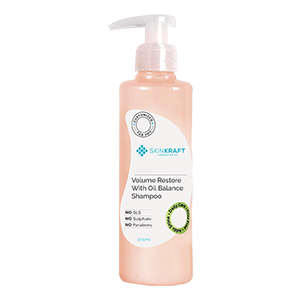After years of torturing your hair with chemicals, heat, sunlight and pollution, it’s become quite a task to restore its health, isn’t it? You have tried everything from deep conditioning treatments, heat protectant serums, damage control shampoos and what not in order to minimize hair loss.
What if we told you that protein is all you need to start off and fix your hair woes? Allow us to explain the role of protein in the health of your hair and thank us later when it works for you.
Highlights:
Does Protein Help Your Hair Grow?
Your hair strands are made up of a protein called keratin [1]. Lack of protein can lead to hair loss.
At any given time, about 5% of your hair is in the resting phase and this is why you lose about 50-100 strands everyday, which is very normal. Hair loss beyond this means that a higher percentage of your hair is in the resting phase [2].
“One of the reasons behind this could be inadequate supply of protein to the hair follicles in order to produce hair. Your daily protein intake should be 30% of your total calorie count. A diet rich in protein is crucial for healthy hair growth,” explains Dr. Zeel Gandhi, a hair care expert at SkinKraft.
How Do You Know If Your Hair Needs Protein?
1. High Porosity Of Hair
If your hair is highly porous, it means that it can absorb water easily and make the hair frizzy and tangled. Inadequate protein in your hair can make the hair porous.
2. Limp Hair
Flat, limp or stringy hair is a sure shot sign that your hair lacks enough protein. Adding protein to your diet or as a hair treatment can make the hair voluminous.
3. Inelastic Hair
To test how elastic your hair is, wet a strand of hair and stretch it. If the strand bounces back without breakage, it can be considered elastic. By boosting protein, you can revitalize your inelastic hair.
4. Damaged Hair
If you feel your hair is dry, brittle, has split-ends and is difficult to manage, your hair is damaged. Adding protein to your diet and taking protein supplements can bring back the health of your hair.
Which Protein Is Best For Hair Growth?
Keratin is a fibrous structural protein that makes up your hair. Lot of protein-rich foods and biotin [3] help in the synthesis of this protein needed for your hair. Hair cuticles [4] absorb keratin and make the hair look full and glossy with protein treatments. Besides keratin, you can also look for pantothenic acid. Sufficient amounts of keratin in your hair makes the hair less frizzy and less prone to damage.
How Can I Add Protein To My Hair?
Now that you know protein is the building block for your hair, the question remains, how do you add it to your hair? You can take protein in oral forms or as hair treatments. Read on.
1. Oral (Natural Foods & Supplements)
Eggs, berries, shrimp, fatty fish, tofu, legumes, nuts and cottage cheese are great sources of protein. Adding these foods to your diet can prevent hair loss over time and make the hair look healthier.
Protein supplements can also be taken if you feel that dietary consumption is doing no good for your hair. They come in the form of protein powders and energy bars.
Protein powders contain whey protein [5] (a protein found in milk), soy (for vegans and vegetarians) or casein (milk-derived). Protein bars contain proteins from foods like soy, whey, lentils, nuts and so on. Choose protein bars with no sugars or low calorie sweeteners.
Whey protein is the most soluble form of protein with low lactose content. Do talk to your doctor if you would like to incorporate whey protein as a protein supplement.
2. Protein Packs (Cosmetic Products & DIY packs)
Protein treatments help fill the gaps in your cuticle by attaching hydrolyzed proteins and adding an extra layer of protection. Protein treatments available in the market come in the form of shampoos, masks and mists. They contain ingredients like white protein, soy protein, hydrolyzed rice protein and silk protein.
You can also consider keratin treatment [6] for hair that is performed at professional salons. It is a chemical process that smoothes out frizzy hair.
Word of Caution:
Avoid ingredients like sulfates [7], parabens, isopropyl alcohol, polyethylene glycol, silicones and cocamide DEA in your protein treatments.
A lot of DIY protein hair packs help nourish your hair and repair the damage. Here are some options you can try:
A. Egg-Yogurt Pack
Eggs are a powerhouse of protein and yogurt contains probiotics needed for healthy hair. Beat the egg and yogurt in a bowl to form a smooth paste. Apply this on to your scalp and hair. Wash with a mild shampoo after 30 minutes to get smooth and shiny hair.
B. Coconut Milk-Avocado Pack
Coconut milk is a source of protein and avocados are rich in vitamin A, B and E. Mash avocado and mix with coconut milk and olive oil for a smooth consistency. Leave this pack on your hair for 30 minutes and rinse off. Refrain from using this pack if you have oily hair, as avocado tends to weigh your hair down.
C. Mayonnaise-Avocado Pack
Mayonnaise is made of eggs, which are great sources of protein. Mash avocado and mix 2 tablespoons of mayonnaise. Apply this on your scalp and hair. Wash with a mild shampoo after 30 minutes.
Are Protein Treatments Good For Your Hair?
Protein treatments for hair repair damage, strengthen hair, reduce breakage and bring back elasticity. Protein treatments are a great way to add some protein to your hair, provided you take all the necessary precautions.
Some of the protein treatments may lack conditioning properties which can result in dry hair. Wheat protein hair treatments can be harmful for people with wheat allergies [8].
It is important to choose protein treatments that contain ingredients suitable for your hair type. Also, check if the treatment is safe if you have color-treated hair.
Note:
Keratin treatment contains either formaldehyde or formaldehyde releasers, which are potential carcinogens [9] (cancer-causing compounds). Make sure you do enough research about the salon to know if they follow safety guidelines.
Wrapping Up
Proteins are the lifelines of your hair strands. If your hair is deprived of protein, it can lead to damaged hair and hair loss. Dietary protein, protein supplements, protein treatments and DIF protein hair masks are all incredible ways to add protein to your hair. Remember to always check if you are allergic to food sources, ingredients in supplements or treatments. And there you go, with stronger and healthier hair!
1.https://www.ncbi.nlm.nih.gov/pmc/articles/PMC4387693/
2. https://www.ncbi.nlm.nih.gov/books/NBK470321/
3. https://www.ncbi.nlm.nih.gov/pubmed/28879195
4. https://www.ncbi.nlm.nih.gov/pmc/articles/PMC4201279/
5. https://www.ncbi.nlm.nih.gov/pmc/articles/PMC3905294/
6. https://www.ncbi.nlm.nih.gov/pubmed/23725308
7. https://www.ncbi.nlm.nih.gov/pmc/articles/PMC4651417/
Recommended Products
Was this Article helpful?
- Least helpful
- Most helpful











